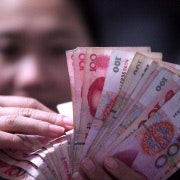China's fledgling brokerage juggernauts
How hard would it be to create another Goldman Sachs? In turbocharged China there are more than 100 outfits trying to accomplish this feat – and in record time, too.
They are the securities brokerages, mostly created in the past 15 years. Now they have reached an uneasy adolescence, trying to keep their mainly retail punters interested in China’s young, struggling stock market.
The Securities Association of China tracks 114 such companies, but most people outside China could barely name a handful. Even for those who know a bit about China’s markets, what is much less appreciated is how far these businesses are already pushing to ape the riskier activities that Western investment banks exploited readily until the financial crisis.
Direct investments in proprietary trading, private equity and other alternative investments are a growing and volatile element of what these brokerages do. Investment income accounted for more than one-fifth of industry profits last year, according to the SAC.
They are also lending more money on margin to investors who want to buy stocks, as well as lending stocks to hedge funds who want to short-sell them.
Goldman Sachs is, or has been, a global leader in most of these businesses – it runs the world’s second-biggest group of private equity funds under management and is number two globally in servicing hedge funds, for instance.
But the Wall Street colossus took almost 150 years to build from its early days clipping commercial paper in 19th-century New York. Meanwhile, the world’s regulators outside of China are now making these riskier activities more costly for banks to pursue, or, in the case of prop trading, trying to stop them outright. This is not only about preventing financial instability, but also about conflicts of interest and the fear that it is too easy for dominant financial groups to extract rents.
China is coming from a very different place, of course, and its markets have to be built much faster.
Since April last year, the Chinese Securities Regulatory Commission has liberalised rules to allow these brokerages to invest in a wider variety of markets, to lower their capital requirements against these activities and to start issuing their own bonds. This last change, made only at the start of this year, has already prompted more than $US13 billion of bond issuance by brokers up to the end of April, according to Reuters data.
The regulator wants more liquidity in the stock and bond markets. However, this is unlikely to be solved simply by allowing brokerages to behave like inexperienced hedge funds and to trade more stocks with each other. What the Chinese regulator really needs to solve is the painfully slow development of both a long-term investing culture and a lack of established institutional investors such as pension schemes, insurers and mutual funds. China’s savings rates are high, but its savers are distracted by higher yielding, shadowy wealth management products.
To be fair to the brokerages, they have very low leverage. The industry’s total net assets were only 1.4 times its net capital at the end of last year, according to the SAC. Galaxy Securities, which is listing in Hong Kong, had net assets of Renminbi15.6bn ($US2.5 billion) at the end of 2012. That barely exceeded its net capital.
However under-developed their markets or risk management, with this kind of leverage, the Chinese brokers have a long way to go before they can blow up the world.
Galaxy’s $US1.1billion initial public offering, set to price this week, holds another equally important lesson. The reason why brokerages want to expand into these riskier activities and into non-Chinese markets is that their core business at home is shrinking. Galaxy’s brokerage revenues are down 40 per cent since 2010. Will it find the grass is any greener outside China? The answer lies in the fact that the book on Galaxy’s IPO is being run by a record 21 banks.
There is a vast disparity between the IPO fees that banks pocket in the US and in Asia – up to 7 per cent of deal volume in the former versus 2.5 per cent or often less in the latter. The reason is the number of banks: Asia excluding Japan had more than three times as many bookrunners as the US did last year, according to Dealogic. The top five in the US took 55 per cent of the market, versus 31 per cent in Asia. In short, equities in Asia needs fewer players not more.
This 114-strong field of Chinese brokers could hold another Goldman Sachs; but in their turbocharged evolution, it’s a very risky bet to pick any one of them.
Copyright The Financial Times Limited 2013.













